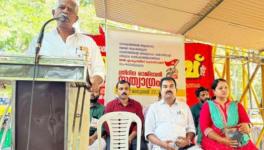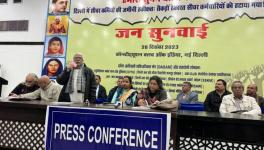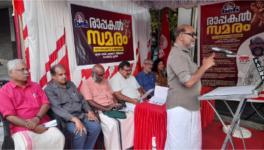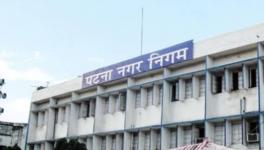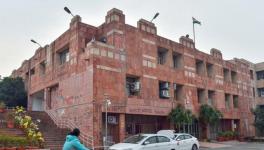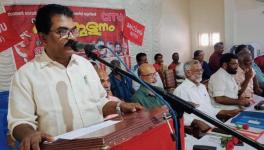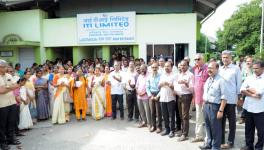Workers Who Sowed a Seed: Story of IIT Bombay Workers’ Fight for Gratuity
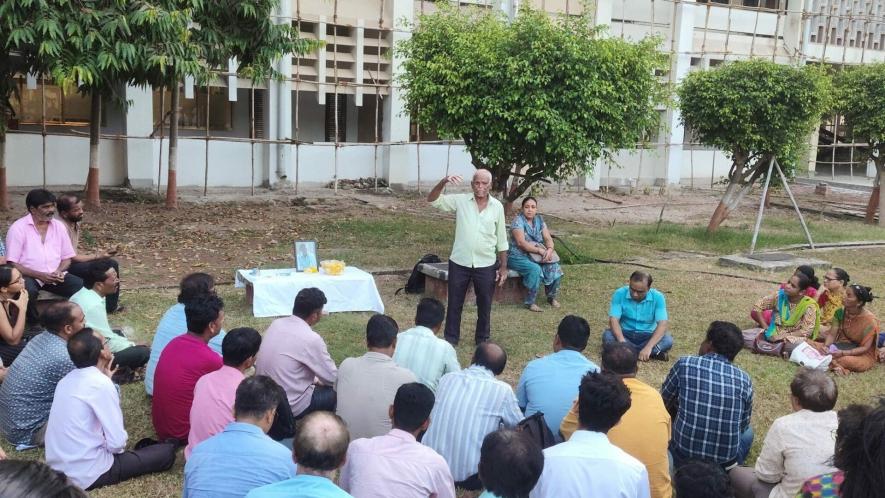
On December 31st, 2019, Raman Garase, along with Dadarao Ingale and Tanaji Lad, were verbally informed by IIT Bombay’s administration that as they have completed 60 years of age, from tomorrow onwards they should not come for work. After their retirement, the IIT administration refused to pay them the gratuity they had accrued over three decades of service. Resolute in their fight for justice, the trio approached the labour commission and successfully obtained rulings twice in their favour, which ordered IIT Bombay to make the payments. Yet, as the administration geared up to appeal these decisions in a higher court, Garase lost all hope. Tragically, on the night of May 1st, Raman Garase took his own life at his home near the IIT campus, where he had worked for 38 years. He died awaiting the receipt of Rs 4,28,805 in gratuity, funds he had intended to use to address several severe health issues, including paralysis, which had developed in the years following his retirement.
Raman Sukar Garase used to work as a Mali (gardener), providing skilled labour to Nursery, Estate Office, IIT Bombay. He was well known for his skills, knowledge of flora and fauna, perseverance and caring nature. For 38 years starting from 1981 till December he has nurtured thousands of trees and plants, shaping their growth with his incessant hard work. By nurturing these trees he has not just contributed to the life of IIT but also has given a breath of fresh air for the residents of Mumbai. In 1981, he was called for work, but a proper interview happened in 1982. Despite working for almost 4 decades, he was never made a permanent employee of the institute.
Dadarao Tanaji Ingale worked as a helper for work of a mason/plumber/carpenter from 1994 to 2019. A permanent employee working at the Estate Office, IIT Bombay, appointed him for the work. It was the IIT officials at the estate office that paid him salary in cash, with the salary slips having IIT Bombay’s name mentioned in them. Tanaji Babaji Lad used to work in the central area, Estate Office, IIT Bombay from 1999 to 2019. He was appointed by an engineer at IIT Bombay. All 3 of them were forced to retire on 31 December 2019, without any prior notice, citing that workers over 60 years of age cannot be employed.
Though they joined IIT in different periods of time, they were destined to be connected in the future. On numerous occasions they worked with each other throughout the period, which developed a certain kind of bond among them. On receiving the news of termination from service they were shocked and became partners in thinking about their uncertain future. The entire work life at IIT started flashing in front of them. The feeling of being cheated and robbed started engulfing them. Being aware of certain labour rights, they thought at least they should receive gratuity. Raman Garase was the most proactive among the three. On 3rd January 2020 he wrote the first letter to the administration demanding their rightful gratuity. It was the first time in the history of IIT Bombay that contract workers were claiming gratuity payment. Administrators who were blissfully ignorant of their duties and legal binding to follow the labour laws, never on their own have proceeded to disburse gratuity amount, nor any contractor (though working for more than 5 years) paid gratuity.
Gratuity is a retirement benefit in India governed by the Payment of Gratuity (PoG) Act, 1972, which mandates that all employees, whether permanent or contractual, are eligible for post-retirement gratuity if they have completed five years of continuous service. The employer must pay gratuity within 30 days of eligibility, with interest accruing on delayed payments. The principal employer is responsible for paying gratuity even for contractual workers hired through contractors. This legislation emphasizes the employer’s duty to acknowledge employees’ long-term contributions by providing financial benefits at the end of their service, underscoring gratuity as both a labour and human right essential for a dignified retirement.
On receiving no response from the IIT administration, workers approached the workers union Asanghatit Kantrati Kamgar Sanghatna (AKKS) for support. Union leaders intervened in the matter and asked the administration to implement the gratuity act for all the contract workers. The union which was formed in 2014 had the largest reach among the workers with around 700 workers being their members. On various issues before, APPSC had been working with the union and with the latest struggle for reinstating hostel 10 mess workers, the solidarity between the workers and students were thickened.
After not getting any positive response from the administration, the union approached the student organization, and together they started to push the administration to heed to workers’ demands. In February 2020, workers submitted the “Form I” to the administration demanding their gratuity. Despite persistent efforts by the workers, workers union and student organization to prompt action, the administration remained unresponsive and failed to provide the workers with their entitled benefits. Early months of 2020 were also the period of strong anti-CAA and anti-NRC protests in IIT Bombay, where various organizations coming together under the forum IIT Bombay for Justice also got involved in demanding gratuity for the contract workers.
Meanwhile, realizing from the non-response from administration and the overall malpractices that goes into the campus, workers also started to put together all the documents they had, that might be useful to claim gratuity. Various documents they collated contained a document dated 9th January 1986 clearly stating that Mr. Raman Garase was working for the last five years under D. C. Purohit, Horticulturist, Estate Office, IIT Bombay. The document also clarified that the relation of Mr. Raman Garase with IIT Bombay was that of employer and employee. Another document dated July 5th 1984 strengthened this argument further, where the Director of IIT Bombay of that time, Prof. A. K. De on his letterhead mentioned that Mr. Garase has been working for the last three and half years within the premises of IITB campus.
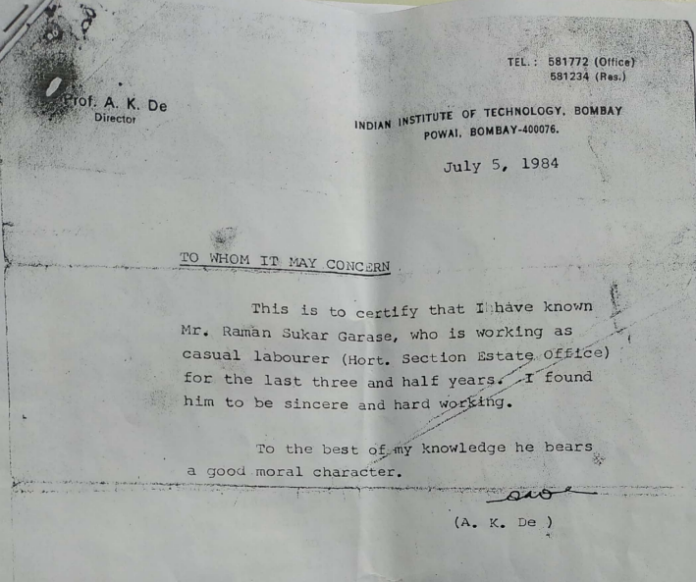
For many workers the relationship between IIT Bombay and workers was that of the immediate employer and the employee. However, with the introduction of contractorship between the workers and IIT Bombay, IIT Bombay became the principal employer bound by not only by the PoG act, 1972 but also by section 21(4) of The Contract Labour (Regulation and Abolition) Act, 1970 (CLRA) which stipulates that if a contractor fails to pay wages within the prescribed period or makes a short payment, the principal employer is responsible for paying the full wages or the unpaid balance to the contract labour.
Even though the three workers fighting for their gratuity were contract workers, it was the officials and engineers of IIT Bombay who used to give them instructions about the work. They used to tell what work has to be done and where it has to be done. Even the decisions about their holidays and leaves were taken by IIT Bombay officials. Moreover, the IIT officials often asked them to do other work on the campus apart from the designated work, such as, Garase and others were asked to remove the ‘jhopda’ (‘illegal encroachments’) on campus. The contractor was responsible only for handing over the salary. During their decades long service, they have seen contractors change after a few years, but have continued working at the Estate office, IIT Bombay. Neither the contractor nor IIT Bombay have given them any terminal benefit or retirement compensation at the time of retirement.
IIT was already violating law by employing contract labourers to do work which should not be done by them. The CLRA, 1970 clearly states that if the work is perennial in nature (i.e., it is not seasonal or temporary but lasts throughout the year), it needs to be done by regular workers rather than contract labour. But in order to not pay the welfare benefits that need to be paid for permanent workers, they choose to keep employing contract labour.
The efforts to seek gratuity also got struck with the COVID lockdown where union, and student organizations were caught up in firefighting efforts as well as seeking rights for workers. The petitions written by the union and IIT Bombay for Justice till August did not receive any response from administration. In September 2020, IIT Bombay for Justice, again raised the issue of non-payment of gratuity to several retired workers who served the institute for decades.
For the first time, the administration gave a written response. They had admitted that the Deputy Registrar, Estate Office, IIT Bombay is the Principal Employer as per provisions of CLRA 1970 and Rules 1971, in an email dated 8th September 2020. This means that the Deputy Registrar, Estate Office, IIT Bombay is violating the law by having not paid gratuity to several of its workers, and specifically, to Raman Garase, Tanaji Lad, and Dadarao Ingale who submitted their “Form I” requesting their gratuity amounts in February 2020. They also mentioned that there is no precedence of providing the gratuity to contract workers so they had forwarded these demands to the legal team of IIT Bombay.
On not receiving anything from the legal team and as already 9 months had passed since the retirement of the workers, they went on to submit the “Form N” i.e. Application for direction before the Controlling Authority under the PoG Act, in September 2020. Controlling authority sought a response from IIT Bombay where the institute refused to pay the gratuity amount and chose to face the trial. In the labour court Akshay Sawant (an author of this series) along with the workers union secretary, represented the workers in labour court to argue their case. In the labour court, IIT Bombay contended that it did not have an employer-employee relationship with three workers, despite their continued employment over the decades under different contractors. The workers’ testimonies contradicted this, demonstrating that IIT Bombay consistently assigned tasks that extended beyond the scope of any current contractor’s responsibilities. This evidence challenged IIT Bombay’s assertion that no employer-employee relationship existed at any time with the institute.
Additionally, IIT Bombay had the audacity to argue that these workers were engaged for “short durations” and tasks related to “wear and tear,” such as “falling of branches of tree,” “nuisance made by cattle,” and “heavy rain.” However, the workers presented decades of pay slips, effectively disproving the institute’s claims and highlighting a serious disregard for labour laws. Tanaji Lad, in particular, demonstrated remarkable diligence by keeping immaculate records of his monthly pay slips over many years. In an era where even ‘prestigious’ institutions armed with elaborate and highly paid bureaucratic machinery, like IITs, fail to maintain accurate records of their long-term employees, Tanaji Lad’s commitment to documentation stands out as an exemplary practice deserving of recognition. IIT was clearly trying to conceal the glaring facts with the malicious intent of denying what is rightful to the workers. There was also a deliberate attempt by IIT to delay the proceedings by keeping on asking for extensions, or not submitting the documents in the given stipulated period, making some lame excuses. The court proceeding took 2 years, with hearings happening almost once in a month, during the COVID pandemic. However, all the workers and their representatives were always present in the hearings despite their old age and health threats due to the pandemic.
On January 2022, the Assistant Labour Commissioner, the Controlling Authority under the PoG Act, 1972 passed an order concluding that the claim of workers is valid and further directed IIT Bombay to pay a sum of INR 4,28,805/- to Mr. Raman Garase, INR 2,35,170/- to Mr. Dadarao Ingle and INR 1,89,945 to Mr. Tanaji Lad. The order also stated that 10% simple interest is payable in addition to this from 31/12/2019 till the date of payment. It observes that the fundamental principle underlying gratuity is that it is a retirement benefit for long service as a provision for old age. Demands of social security and social justice made it necessary to provide for payment of gratuity. On the enactment of the PoG Act, 1972, a statutory liability was cast on the employer to pay gratuity. It added that the PoG Act is in the genre of statutes like the Minimum Wages Act, ESI etc. which lay down the relevant minimum benefits which must be afforded by employers to their workers. It also observed that the PoG Act, 1972, serves as a central law, and Section 14 clearly dictates that its provisions supersede any conflicting terms in other laws or agreements. It is evident that when the gratuity of an employee is governed by the Gratuity Act, this statute takes precedence over all other legislative or contractual provisions. It also observed that Article 300-A of the Indian Constitution states that no person shall be deprived of their property unless authorized by law. Thus, the removal of a pension, gratuity, or leave encashment by the appellant without legal backing or merely on administrative grounds is fundamentally unjustifiable and cannot be supported.
The Controlling Authority noted that IIT Bombay is the Employer in case of worker’s gratuity claim as per definition of an “employer” as per Section 2(f) of the Act, emphasizing those with ultimate control over the establishment’s affairs. At the time of the applicant’s employment cessation due to age, IIT Bombay through its contractor was identified as the employer since it controlled the establishment’s operations. The PoG Act, 1972 says that an employee means any person. This “any person” is a broader term, which includes even a contract worker. The applicant was initially employed directly by IIT Bombay and subsequently through various contractors, working continuously for years. The Controlling Authority observed that given the absence of any formal appointment letter, it can be deduced that the workers were employed under implied terms of employment, thus qualifying as an employee under the PoG Act, 1972. The judgment also details evidence submitted by the workers, including wage slips and ESI identity cards, to support their claim of continuous service at IIT Bombay, and it critiques IIT Bombay’s lack of evidence to dispute the employment relationship. The judgment underscores that in social welfare cases, where precise records may not always be available, decisions should be based on the balance of probabilities to promote social justice.
The judgment concluded that evidence submitted by workers confirms that they completed decades of continuous service at IIT Bombay, until their retirement in December 2019, when they reached 60 years of age—the designated retirement age for IIT Bombay employees. This duration of service and the retirement circumstances were not contested by the institute. Notably, although contract labourers typically do not have a specified retirement age under the CLRA 1970, IIT Bombay retiring these workers upon reaching the retirement age applicable to IIT Bombay employees, also proved that they are employees of IIT Bombay.
The judgement discusses the importance of livelihood as an integral part of the right to life (Article 21), as recognized by the Indian Supreme Court. It argues that the PoG Act, 1972, and other social welfare legislations like the Employees Provident Fund & Misc. Provisions Act, 1952 and the Employees State Insurance Act, 1948, protect the welfare of contract workers by including them in the definition of “employee.” This inclusion ensures that contract workers are entitled to the same benefits as other employees, including gratuity.
One of IIT’s contention with demand for gratuity was that it will raise objections in audit by Comptroller and Auditor General because many other institutes were not giving gratuity. They would also have to justify why they did not give gratuity to all the workers who worked before 2019. They would also be at fault for not mentioning about gratuity in the contract tenders that were floated over the years.
While the case was going on in front of the Controlling Authority at the labour court, IIT officials stooped further low to start vilifying these three workers in order to break the unified strength of workers. They spread rumours among campus workers blaming these 3 workers who went to court, claiming that IIT was always ready to give gratuity to all workers but now due to the court case, it is getting delayed. IIT Bombay administration has a long history of doing propaganda to break the unity of workers and sowing seeds of discord. Towards the last phase of the hearing they also offered an outside court settlement on the condition that workers take back the case, and IIT will only pay for the period of 7 years from 2013 which is for the latest contractor. So, their plan was to pay workers from the contractor’s side and absolve themselves from paying the gratuity money for the previous years. Knowing the malicious plans of IIT administration workers remained resolute and continued to fight the case in the court. While on the other hand some officials also promised that they are in favour of workers’ rights and it is a justified demand that workers should get the gratuity amount. They promised that they will make sure workers get the gratuity amount once the order is passed.
However, once the order was passed, IIT Bombay never paid the gratuity. Instead, to further delay the payment of gratuity, they challenged the judgment of the Controlling Authority with the Deputy Chief Labour Commissioner, the Appellate Authority under PoG Act, 1972 in June 2022. The appeal by IIT Bombay lacked new arguments or fresh evidence, merely repeating points previously addressed by the Controlling Authority. The Institute again shamelessly claimed contract workers are hired temporarily for maintenance tasks, whereas the documentary evidence screams out loud proving otherwise. The whole appeal was a clear case of concealing the glaring facts with the malicious intent of denying what is rightful to the applicants. Workers sought help from advocate Sudha Bharadwaj, who argued again that they were under the direct supervision and control of IIT Bombay, which was responsible for giving work instructions, approving leave, and processing salaries, despite the contractors changing over time. The workers were involved in continuous service for IIT Bombay, often performing tasks beyond their initial job description, such as demolishing slums and clearing lake areas, activities that posed risks to their safety. The use of contractors was primarily a means for IIT Bombay to handle salary payments, serving as a way to circumvent the establishment of permanent employment relationships and avoid providing equal pay to the workers compared to permanent staff.
On August 4, 1999 a learned full bench of the Honourable Supreme Court of India, in the case of Indian Petrochemical Corporation Ltd vs. Shramik Sena [1999 (83) FLR 74] has ruled that the contract workers working in the canteen of the factory would be the employees/workers of the Principal Employer for the purpose of Factories Act, 1948. The Honourable High Court of Madras, in the case of Dhakshinamurthy S vs. Deputy Commissioner of Labour (Appeals), Appellate Authority under PoG Act, 1972, Chennai & others (2003-I-LLJ-32), has ruled that “the principal employer is liable to pay gratuity to contract labor”. In a recent case (Subramaniam S. Arjun and Ors vs ONGC), the Bombay High Court in 2023 ruled that ONGC, as the principal employer, was liable for the gratuity payments to the contract workers, even though they were employed through contractors. These decisions affirmed the workers’ right to gratuity despite the contractual nature of their employment and show that gratuity should be treated as wages, and the onus of payment falls upon the principal employer if the written contract does not ask the contractor to pay or the same worker has worked under different contractors who fail to pay gratuity even though the contract mentions the contractors to pay. This binds IIT Bombay as the principal employer to pay gratuity to the contract worker from the time they had started working for the Institute.
IIT Bombay kept proposing out-of-court settlement offers to these three workers, maximum offering compensation equalling 10 years of gratuity. However, the compensation was to be framed not as gratuity, but as a welfare contribution or donation, sourced from alumni and faculty. The workers declined these offers, standing firm in their demand for rightful wages, which they believe are due after decades of service. They recognized that accepting gratuity would set a legal precedent, potentially aiding thousands of other workers at IIT Bombay and even millions across the country in securing similar entitlements. This battle, they understand, extends beyond their individual circumstances and holds significant implications for the labour rights of millions of workers nationwide.
In August 2022, following a favourable ruling from the controlling authority in response to workers’ demands for gratuity, IIT Bombay established a committee to address the issue for all workers. The committee is composed of five faculty members, a retired labour commissioner, and three deputy registrars. IIT Bombay has agreed to pay gratuity to all contract workers for their employment since 2010, marking a significant victory after the year’s long struggle led by these three determined contract workers. Despite this progress, IIT Bombay remains adamant in its decision not to provide gratuity for work performed before 2010.
On 3rd April 2024, 4 years 3 months after the workers submitted their demand for gratuity, the Appellate Authority upheld the order of the controlling Authority and deemed the appeal by IIT Bombay invalid, in a significant victory for workers. Raman had endured significant mental, physical, and financial hardships during this long legal battle, steadfastly refusing to give up. In contrast, for a large institution like IIT, the costs associated with this case likely represented a minor financial blip in its vast budget, one that probably went unnoticed by the institution and could have persisted for years without significant attention. This victory in the labour court brought no relief to the ailing Raman, as he learned that IIT Bombay was planning to appeal against this victory in the High Court. He knew that an appeal in one more court meant a tedious legal battle of at least another 3-4 more years.
He ended his struggle for justice by committing suicide on the night of May Day, which is observed internationally as Labour Day. Looking back, Raman may have regretted the respect he once had for this “prestigious” institution. When it came to acknowledging his fundamental rights, this “prestigious” institution not only ignored him but also used its influence and reputation to drive him to despair, which ultimately led to his demise, instead of honouring his basic rights—simply because it faced no consequences. Instead of recognizing the workers’ rights, IIT Bombay opted to spend substantial amounts on hiring expensive legal counsel, prioritizing legal fees over fair treatment of its workers.
Providing workers with their rightful compensation is not just a matter of legal compliance; IIT Bombay and the entire campus community hold a deep ethical responsibility toward these contract workers. These individuals have dedicated years of service to the institution, during which they have woven themselves into the fabric of campus life, building close social ties with students and faculty alike. Over time, they have become an integral part of our community. Despite this, there is a palpable sense of disenchantment among these workers. They are marginalized and overlooked, as their contributions are rendered invisible and their jobs are perpetually unstable. This series aims to highlight these issues, urging a reassessment of how the campus community values and recognizes the essential roles these workers play.
The ongoing injustice faced by contract workers at IITs reveals a disturbing disregard for labour rights within these prestigious institutions. Despite labour courts twice ruling in favour of the workers, mandating the payment of their rightful gratuity, the IITs have obstinately continued to appeal to higher courts, dragging out the process for years. This relentless legal battle, seemingly designed to exhaust and demoralize the workers, has led to tragic consequences, including the suicide of Raman Garase who fought tirelessly for justice. His death, a direct result of the institutions’ callousness, highlights the severity of this crisis. The IITs’ practice of employing contract workers for permanent tasks is not only illegal but also a flagrant abuse of power. Such exploitation diminishes the dignity of labour and denies workers their deserved respect, welfare, and wages. It is imperative that these institutions cease their exploitative practices, grant permanent status to the workers, and honour their fundamental rights. The IITs must be held accountable for their actions and must commit to creating a fair and humane working environment that truly reflects the values of justice and integrity they profess to uphold.
Raman Garase, Dadarao Ingale and Tanaji Lad with their tireless fight have done what Raman did the best throughout his life. They have planted a seed, a seed for incessant fight for justice, and demand to be treated rightful and dignified. It is up to us now how we nurture and grow this plant they have sowed.
The Authors are students at IIT Bombay and members of Ambedkar Periyar Phule Study Circle (APPSC).
Get the latest reports & analysis with people's perspective on Protests, movements & deep analytical videos, discussions of the current affairs in your Telegram app. Subscribe to NewsClick's Telegram channel & get Real-Time updates on stories, as they get published on our website.











